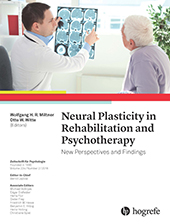Plasticity During Short-Term Visual Deprivation
Abstract
Abstract. During everyday experiences, people sometimes close their eyes to better understand spoken words, to listen to music, or when touching textures and objects. A plausible explanation for this observation is that a reversible loss of vision changes the perceptual function of the remaining non-deprived sensory modalities. Within this work, we discuss general aspects of the effects of visual deprivation on the perceptual performance of the non-deprived sensory modalities with a focus on the time dependency of these modifications. In light of ambiguous findings concerning the effects of short-term visual deprivation and because recent literature provides evidence that the act of blindfolding can change the function of the non-deprived senses within seconds, we performed additional psychophysiological and functional magnetic resonance imaging (fMRI) analysis to provide new insight into this matter. Eye closure for several seconds led to a substantial impact on tactile perception probably caused by an unmasking of preformed neuronal pathways.
References
(2003). Non-invasive mapping of connections between human thalamus and cortex using diffusion imaging. Nature Neuroscience, 6, 750–757.
(2013). The dark side of the alpha rhythm: fMRI evidence for induced alpha modulation during complete darkness. The European Journal of Neuroscience, 37, 795–803.
(1933). Über das Elektrenkephalogramm des Menschen
[About human’s electroencephalogram] . Archiv für Psychiatrie und Nervenkrankheiten, 99, 555–574.(2010). EEG changes in comparison of rest states with open and closed eyes in complete darkness. Fiziologiia Cheloveka, 36, 138–141.
(2000). Enhanced excitability of the human visual cortex induced by short-term light deprivation. Cerebral Cortex, 10, 529–534.
(2015). The impact of eye closure on somatosensory perception in the elderly. Behavioural Brain Research, 293, 89–95.
(2016). Age-dependent modulation of the somatosensory network upon eye closure. Behavioural Brain Research, 298, 52–56.
(2015). Eye closure enhances dark night perceptions. Scientific Reports, 5, 10515. doi: 10.1038/srep10515
(2003). Neural correlates of cross-modal binding. Nature Neuroscience, 6, 190–195.
(1997). Functional relevance of cross-modal plasticity in blind humans. Nature, 389, 180–183.
(1962). Psycho-physiological studies in altered sensory environments. Journal of Psychosomatic Research, 6, 259–281.
(1974). Human sensory dominance. Perception & Psychophysics, 16, 409–412.
(2014). Short-term visual deprivation, tactile acuity, and haptic solid shape discrimination. PLoS One, 9, e112828. doi: 10.1371/journal.pone.0112828
(1963). Cognitive structuring, field dependence-independence, and the psychophysiological response to perceptual isolation. Recent Advances in Biological Psychiatry, 6, 119–128.
(1959). Changes in perceptual function after isolation. Canadian Journal of Psychology, 13, 210–219.
(1998). Crossmodal attention. Current Opinion in Neurobiology, 8, 245–253.
(1965). Auditory sensitivity after prolonged visual deprivation. Psychonomic Science, 3, 359–360.
(1997). Restricted attentional capacity within but not between sensory modalities. Nature, 387, 808–810.
(2005). A new SPM toolbox for combining probabilistic cytoarchitectonic maps and functional imaging data. NeuroImage, 25, 1325–1335.
(1993). Nuclear science symposium and medical imaging conference, 1993 IEEE conference record (Vol. 1813, pp. 1813–1817). San Francisco, CA: USA,
(2003). Short term light deprivation increases tactile spatial acuity in humans. Neurology, 60, 1998–1999.
(2012). The aftereffects of ventriloquism: The time course of the visual recalibration of auditory localization. Seeing Perceiving, 25, 1–14.
(2003). Investigating directed cortical interactions in time-resolved fMRI data using vector autoregressive modeling and Granger causality mapping. Magnetic Resonance Imaging, 21, 1251–1261.
(1969). Investigating causal relations by econometric models and cross-spectral methods. Econometrica, 37, 424–438.
(1963). Recovery from early blindness; a case study. Cambridge, UK: Heffer.
(1978). The effect of unimodal sensory deprivation on sensory processes: A decade of research from the University of Manitoba. Canadian Psychological Review/Psychologie canadienne, 19, 128–144.
(1949). The organization of behavior. New York, NY: Wiley.
(2002). Braille character discrimination in blindfolded human subjects. Neuroreport, 13, 571–574.
(1997). MRI and PET coregistration – a cross validation of statistical parametric mapping and automated image registration. NeuroImage, 5, 271–279.
(2006). Multisensory activation of the intraparietal area when classifying grating orientation: A functional magnetic resonance imaging study. The Journal of Neuroscience, 26, 7491–7501.
(2007). EEG alpha oscillations: The inhibition-timing hypothesis. Brain Research Reviews, 53, 63–88.
(2011). Insights from darkness: What the study of blindness has taught us about brain structure and function. Progress in Brain Research, 192, 17–31.
(2008). Abnormal tactile discrimination and somatosensory plasticity in familial primary hyperhidrosis. Neuroscience Letters, 441, 332–334.
(2004). Eyes open and eyes closed as rest conditions: Impact on brain activation patterns. NeuroImage, 21, 1818–1824.
(2008). Rapid and reversible recruitment of early visual cortex for touch. PLoS One, 3, e3046. doi: 10.1371/journal.pone.0003046
(1977). Molyneux’s question: Vision, touch, and the philosophy of perception (Vol. 88). Cambridge, UK: Cambridge University Press.
(1966). Studies on sensory deprivation. Shinrigaku Kenkyu: The Japanese Journal of Psychology, 37, 44–59.
(2005). The plastic human brain cortex. Annual Review of Neuroscience, 28, 377–401.
(2001). The metamodal organization of the brain. Progress in Brain Research, 134, 427–445.
(1963). Studies in sensory deprivation. Archives of General Psychiatry, 8, 435–454.
(1991). Mechanisms of visual plasticity: Hebb synapses, NMDA receptors, and beyond. Physiological Reviews, 71, 587–615.
(1964). Changes in body image following sensory deprivation in schizophrenic and control groups. Journal of Abnormal Psychology, 68, 168–176.
(2005). Mapping directed influence over the brain using Granger causality and fMRI. NeuroImage, 25, 230–242.
(2006). Quantitative sensory testing in the German Research Network on Neuropathic Pain (DFNS): Standardized protocol and reference values. Pain, 123, 231–243.
(1996). Activation of the primary visual cortex by Braille reading in blind subjects. Nature, 380, 526–528.
(1967). Changes in olfactory and gustatory sensitivity after prolonged visual deprivation. Canadian Journal of Psychology, 21, 337–345.
(2010). A MATLAB toolbox for Granger causal connectivity analysis. Journal of Neuroscience Methods, 186, 262–273.
Suedfeld P.Turner J. W.Fine T. H.Eds.. (1990). Restricted environmental stimulation. New York, NY: Springer.
(1994). A psychophysical study of the mechanisms of sensory recovery following nerve injury in humans. Brain, 117, 149–167.
(1961). Sensory deprivation and pain thresholds. Science, 133, 330–331.
(2011). Short-term visual deprivation does not enhance passive tactile spatial acuity. PLoS One, 6, e25277. doi: 10.1371/journal.pone.0025277
(2005). Tactile discrimination of grating orientation: fMRI activation patterns. Human Brain Mapping, 25, 370–377.
(1964). Cutaneous sensitivity after prolonged visual deprivation. Science, 144, 1591–1593.



